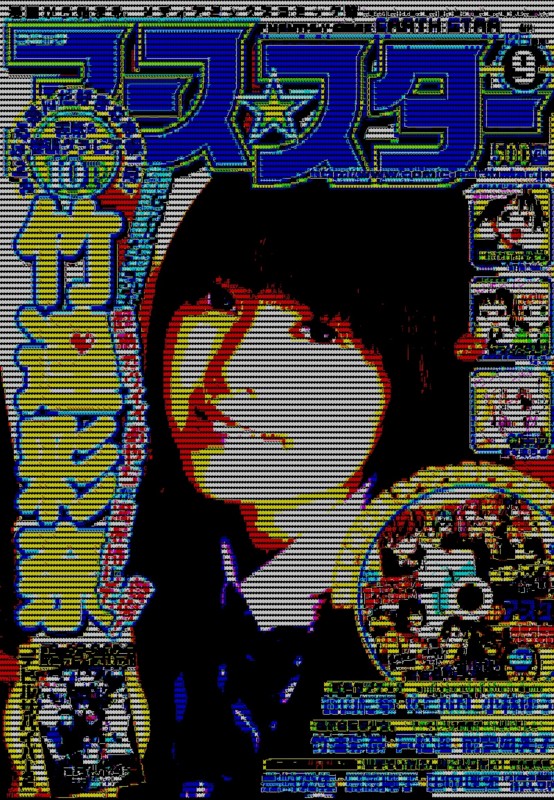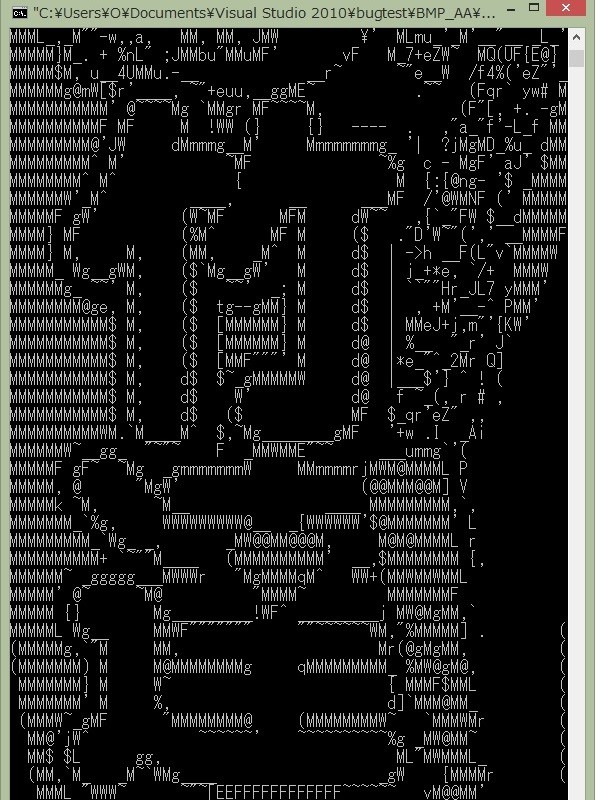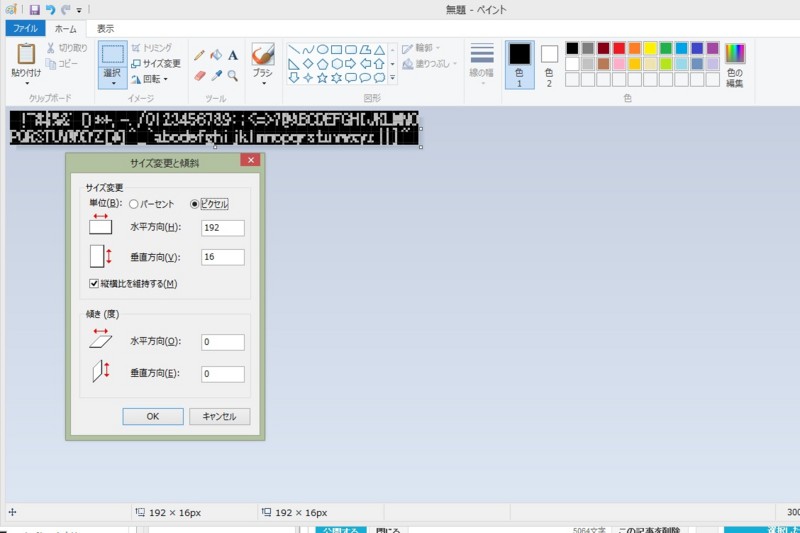Fortran で BMP -> ASCII 変換のプログラムを作ります。
基本的な原理は、フォントのビットマップを(非直行、非完全、非独立)基底ベクトルとして、画像をフォントのサイズごとに細切れにして、その小さなビットマップをベクトルとみなして、各フォント基底とユークリッド距離をとり、距離最小のフォントを選択するものです。
ユークリッド距離を他の距離やエントロピー風に変えてもあんまり結果は変わらない感じです。
RGB三原色に分けて出力し、色を付けて再合成した例を以下に示します。

モノクロのコンソール出力

大きいフォントでの拡大図

プログラムは、BMPファイル読み書き用のモジュールと、メインのプログラムからなります。Fortran95 で導入された elemental 属性のスカラー関数を定義すれば、ループを明示的に書かなくて済むので、30行程度で実現できました。
このほかに、フォントデータを生成する別のプログラムが必要です。これが一番面倒かもしれません。BMPファイルはy軸方向の座標がひっくり返っているので少し混乱しました。また、Fortran には符号なし整数がないため、RGB データの1バイト整数が見かけ上負数になったりして混乱しました。
なお、Fortran2003 の配列自動再割り付けを使っていますので、適切なコンパイラ・オプションが必要となります。
メイン・プログラム
module m_bmp implicit none type :: t_bmp_file_header sequence integer(2) :: bfType = transfer('BM', 0_2, 1) ! BitMap integer(4) :: bfSize ! file size in bytes integer(2) :: bfReserved1 = 0 ! always 0 integer(2) :: bfReserved2 = 0 ! always 0 integer(4) :: bfOffBits end type t_bmp_file_header ! type :: t_bmp_info_header sequence integer(4) :: biSize = Z'28' ! size of bmp_info_header ; 40bytes integer(4) :: biWidth integer(4) :: biHeight integer(2) :: biPlanes = 1 ! always 1 integer(2) :: biBitCount integer(4) :: biCompression = 0 ! 0:nocompression, 1:8bitRLE, 2:4bitRLE, 3:bitfield integer(4) :: biSizeImage integer(4) :: biXPelsPerMeter = 3780 ! 96dpi integer(4) :: biYPelsPerMeter = 3780 ! 96dpi integer(4) :: biClrUsed = 0 integer(4) :: biClrImportant = 0 end type t_bmp_info_header ! type :: t_rgb sequence integer(1) :: ib, ig, ir end type t_rgb contains subroutine rd_bmp(fn, bmp) character(len = *), intent(in) :: fn type(t_rgb), allocatable, intent(out) :: bmp(:, :) type(t_bmp_file_header) :: bmp_file_header type(t_bmp_info_header) :: bmp_info_header open(9, file = fn//'.bmp', form = 'binary', status = 'unknown') read(9) bmp_file_header read(9) bmp_info_header allocate( bmp(bmp_info_header%biWidth, bmp_info_header%biHeight) ) read(9) bmp close(9) return end subroutine rd_bmp end module m_bmp
program BMP_data use m_bmp implicit none integer, parameter :: mx = 4, my = 8 type :: t_cha_bmp type(t_rgb) :: m(mx, my) end type t_cha_bmp integer, parameter :: ncol = 48, nrow = 2 type (t_cha_bmp) :: aa(ncol * nrow), tmp ! 20H..AEH type(t_rgb), allocatable :: bmp(:, :) integer :: ix, iy, nx, ny, ipos ! open(13, file = 'font'//'.dat', status = 'unknown', form = 'unformatted') read(13) aa call rd_bmp('tktt', bmp) ! call rd_bmp('font4x8', bmp) nx = size(bmp, 1) ny = size(bmp, 2) do iy = 1, ny / my do ix = 1, nx / mx associate( kx => mx * (ix - 1) + 1, ky => ny - my * (iy - 1) ) tmp%m = bmp(kx:kx + mx - 1, ky:ky - my + 1:-1) ipos = minloc( distance(tmp, aa), 1 ) + z'1F' write(*, '(g0)', advance = 'no') achar(ipos) end associate end do write(*, *) end do stop contains pure elemental integer function distance(cha1, cha2) type(t_cha_bmp), intent(in) :: cha1, cha2 real, parameter :: f = 6.5 / 3.0 distance = sum( ( (int1to4(cha1%m%ir) - f * int1to4(cha2%m%ir)) & + (int1to4(cha1%m%ig) - f * int1to4(cha2%m%ig)) & + (int1to4(cha1%m%ib) - f * int1to4(cha2%m%ib)) )**2 ) end function distance pure elemental integer function int1to4(i) integer(1), intent(in) :: i int1to4 = transfer(i, 0) end function int1to4 end program BMP_data
ここで、距離を求める関数 distance 中の係数 f は経験的なパラメータで、画像の露光量にあたるものを変化させるために導入しました。微妙に変えてやると見栄えが良くなります。
フォントのビットマップデータ作成プログラム。フォントとしては日本語DOS窓のMSゴシック 4x8ドットを用いました。たまたま試してみただけで、深い理由はありません。フォントの使用範囲はASCIIの 20H から 7FH までの96個を用いました。
program BMP_data use m_bmp implicit none integer, parameter :: mx = 4, my = 8 type(t_rgb), allocatable :: bmp(:, :) type :: t_cha_bmp type(t_rgb) :: m(mx, my) end type t_cha_bmp integer, parameter :: ncol = 48, nrow = 2 integer :: ix, iy type (t_cha_bmp) :: aa(ncol, nrow) ! 20H..AEH ! call rd_bmp('font4x8', bmp) do ix = 1, ncol do iy = 1, nrow associate( kx => mx * (ix - 1) + 1, ky => my * iy ) aa(ix, nrow - iy)%m = bmp(kx:kx + mx - 1, ky:ky - my + 1:-1) end associate end do end do open(13, file = 'font.dat', status = 'unknown', form = 'unformatted') write(13) aa stop end program BMP_data
フォント表示プログラム
program abc implicit none integer, parameter :: n = 16 * 6 character :: cha(n) integer :: i print *, n do i = 1, n cha(i) = achar(32 - 1 + i) end do print '(48g0)', cha end program abc
DOS窓を ALT + PrintScreen でキャプチャーし、ペイントで必要な二行分のフォント画像を切り取って 24bit BMP 形式で保存します。


これをフォント生成プログラムの入力とします。出力された font.dat は、 ASCII ART 生成プログラムの入力となります、